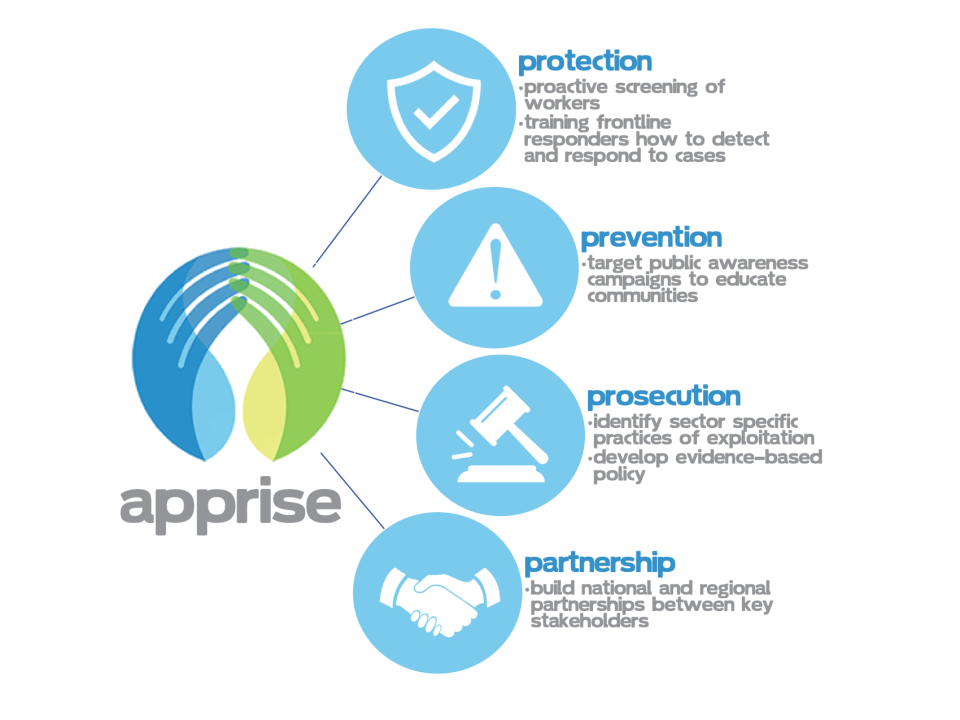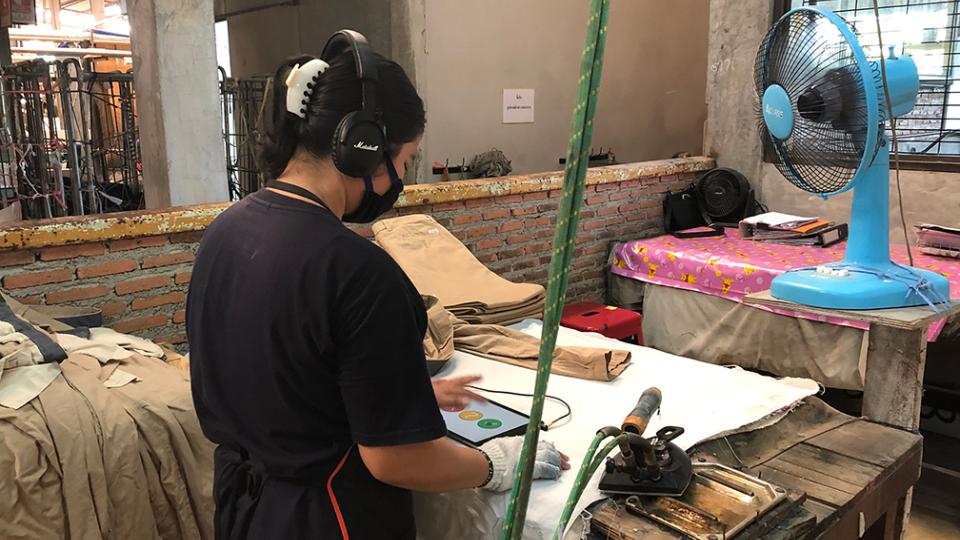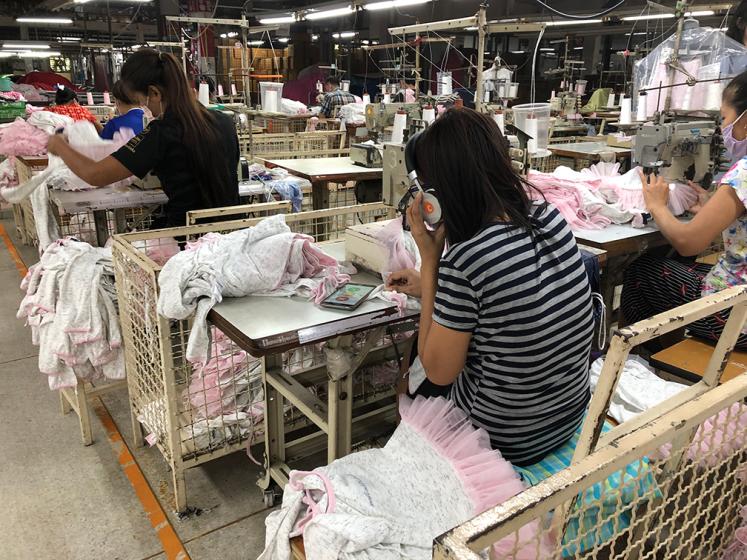Forced labour and human trafficking have become one of the biggest challenges in global justice systems: 25 million people are trapped in these situations (Global Slavery Index(GSI), 2018), but less than 0.4% are being successfully identified and subsequently helped. To improve current failing victim-identification mechanisms, UNU Institute in Macau Principal Research Fellow, Hannah Thinyane developed Apprise to support proactive and consistent screening of vulnerable populations for indicators of labour exploitation.
Compared with crimes like robbery or theft, current forms of exploitation are difficult to detect. Not only do the practices of labour exploitation vary from industry to industry, but they also often incorporate subtle forms of psychological coercion, such as deception, harassment and discrimination rather than just physical violence which is often easier to identify (Hopper and Hidalgo, 2006). Furthermore, these patterns and practices of exploitation are in constant change, which makes it even harder to detect them (Skrivankova, 2010). According to the 2019 Trafficking in Persons report, “Governments and businesses would dramatically improve their ability to identify and suppress human trafficking if they focused on the subtler ‘invisible’ abuses of power, discrimination, debt bondage, and financial coercion that actually keep workers enslaved, rather than on ‘traditional’ notions of slavery such as physical abuse.” (US State Department, 2019: 8).
This article focuses on how Apprise is designed to target human trafficking and labor exploitation in different industries (e.g. fishing and manufacturing), with the aim of contributing to more responsive policies under the 4P’s framework - Protection, Prevention, Prosecution, and Partnership (UNHCHR, 2000; Kelly&Dylan, 2015; UN, 2010).

Protection
The Migrant Tech team held a series of stakeholder consultations in 2017 with the purpose of understanding the problems that stakeholders face in identifying victims of labor exploitation and human trafficking. One of the direct forms of victim-identification comes from frontline responders (FLRs) - such as law enforcement officers or NGO workers - being able to screen and identify potential victims that they may get in contact with. From these consultations, the research team identified some key challenges for FLRs in victim identification and effective response, particularly language barriers between the FLRs and the workers, privacy issues during the interviews between the FLRs and the workers, and lack of training in identifying signs of exploitation and how to proceed when such cases or indicators were flagged. These issues would undermine the capacity of FLRs to proactively and consistently identify and help workers in situations of exploitation.
Due to the complex and volatile nature of exploitation, the research team proposed the use of Sentinel Surveillance to support FLRs to identify changing patterns of exploitation over time, location and sectors through micro-level data collected by FLRs when screening workers. Apprise creates a log of screening responses that could be used for sentinel surveillance of labor exploitation practices.
While Apprise is installed on the frontline responders’ phone, it is ultimately a tool in the potential victims’ hands. When a frontline responder first meets someone who they wish to interview, they select a question list appropriate to their work environment, hand them their phone and a set of headphones, and prompt them to use the app. Apprise was designed to be able to evaluate the vulnerability of a worker’s situation in different work contexts and industries/sectors. After the interview, FLRs can get a vulnerability rating, which is calculated from the worker’s responses to the questions on the mobile app, to help them understand how vulnerable the worker’s situation is. This information can be used by FLRs to conduct further on-site investigations and to help inform them on their next steps.
With Apprise’s assistance, responders can proactively and consistently screen workers for indications of exploitation. Through screening, not only more potential victims could be identified, but also inform sector-specific protection measures and guidelines. Within supply chains, the fear of reprisals keeps workers from reporting unfair or unsafe working conditions. More private, frequent, inclusive and consistent screening is required in these cases to be able to monitor for workplace exploitation.
The data collected can also be beneficial for governments and NGOs to evaluate the current state of labor exploitation, and train FLRs on how to detect and respond to cases of labor exploitation and human trafficking.

For example, in one of the research trips in Thailand, forced pregnancy testing was flagged in Apprise by many workers across different factories. Because the issue was identified, FLRs were able to investigate and conclude that there were no specific health check-up requirements in some factories, leading to pregnancy tests being forced upon new workers by their recruitment agencies. Based on this finding and further investigation, factory management teams specified exact health check-up requirements for new workers.
Prevention
On the one hand, many governments are already taking steps to prevent, combat and eradicate human trafficking in the context of international migration at regional, national and international levels (Walk Free Foundation, 2019). In 2018, 36 countries had taken steps to investigate forced labor in private or public supply chains, a significant increase from the four governments identified in 2016 (GSI, 2018). The United Nations (UN) has also put forward the Global Compact for Safe, Orderly and Regular Migration in 2018, which represents the first global effort to address the vulnerabilities in migration and the safeguarding of migrants.
On the other hand, there is a lack of accurate and disaggregated data as a basis for evidence-based policies. Regarding the current efforts against modern slavery, underlying evaluation surveys are often questioned by their unclear or unrealistic project objectives and their opaque evaluation standards (Walk Free Foundation, 2019). By enabling the collection of high-quality data from workers, Apprise can inform public awareness campaigns to educate communities more prone or vulnerable to the risk of exploitation.
Going back to the forced pregnancy testing example, female workers were not aware of the illegality of forced pregnancy testing. With this situation investigated by FLRs and reported to competent authorities and local NGOs, it would be possible to create regulations and share information regarding health-check verifications around relevant local communities prior to joining factories in Thailand in order to prevent women from being subject to forced testing.
Prosecution
Determining a crime of labor exploitation is a challenge due to the complexity of stakeholders involved in each industry. Apprise can provide first-hand data to identify sector-specific practices of exploitation, as well as develop evidence-based policies for reference. This information can support prosecution by uncovering patterns and hot spots of exploitation and human trafficking. For example, in the United Kingdom, eight people have been convicted over the exploitation of 400 victims mainly from Poland (Guardian, 2019) as a result of a three-year investigation. Apprise could help contribute to dismantling trafficking rings and networks in a faster pace, giving an advance in the cat-mouse game between law enforcement and traffickers.
In supply chains, the role of businesses in addressing labor exploitation has gained more and more attention in recent years. Supply chains have grown to be extremely profitable businesses in Southeast Asia, though at the expense of poor working conditions from the suppliers’ end (Walk Free Foundation, 2019). The huge economic benefits of supply chains make labor exploitation not only a political issue, but also part of market behaviors. It is estimated that $354 billion in goods annually that are “at risk” of being products of modern slavery in G20 countries alone (Evans&Freitag, 2019). In this case, financial penalties for the factories might enable the imposed sentences to have a deterrent effect.
Partnerships
Partnerships augment efforts by bringing together diverse experiences, amplifying messages, and leveraging resources to strengthen existing legal structures. Apprise could be used as a data sharing platform, to support greater understanding of the practices in these cross-border criminal activities.
Summary
Apprise is a tool for FLRs to screen workers in vulnerable situations, which was built as a result of continuous engagement and participation of key stakeholders, including governmental departments, non-governmental organizations, NGOs, and survivors of exploitation. Over the last two years, Apprise has emerged as a partnership in Thailand for fighting labor exploitation and human trafficking. It inspires stakeholders in other areas and sectors to build national or regional partnerships and co-create more innovative solutions.
Article on this site reflects the views of respective authors in their individual capacities and not the views of UNU/UNU Institute in Macau.


